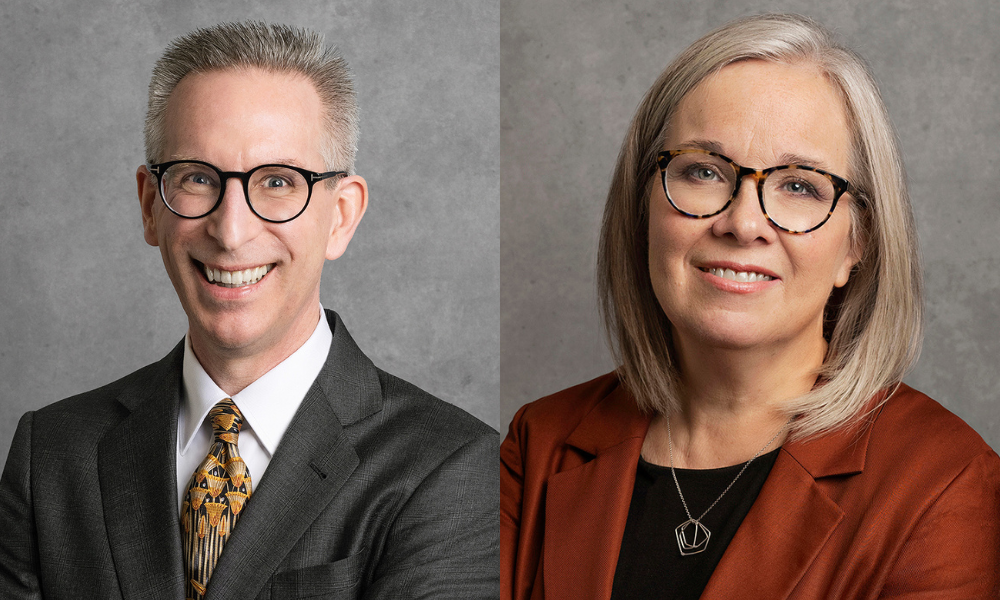
Sharon Vogel and David Edinger were tapped as co-managing partners on Jan. 1

At Singleton Urquhart Reynolds Vogel LLP, newly-tapped co-managing partners Sharon Vogel and David Edinger are based on opposite sides of the country, but that doesn’t mean each lawyer’s leadership efforts will be relegated to their own office.
“The way we conceived it, and the way Singleton has done in the past, is shared responsibility,” Edinger says.
“It's not as if Sharon is just responsible for Toronto and I'm just responsible for Vancouver,” he says. He adds, “Neither of us becomes a bottleneck for decisions. We can share responsibility as we need across our busy practices to get stuff done.”
Vogel and Edinger started their roles as co-managing partners on Jan. 1. Vogel, who specializes in the construction industry, left Borden Ladner Gervais LLP to open Singleton Reynolds’ Toronto office in 2018. She previously served as chair of the firm’s construction and infrastructure practice group. Edinger joined Singleton Reynolds in 2014 after more than two decades at the now-defunct Heenan Blaikie LLP. His expertise includes commercial, construction, professional liability, entertainment, and employment disputes.
Read next: Your journey to becoming a construction lawyer in Canada
Both lawyers will continue to maintain their practices.
According to Vogel, staying nimble is a priority for Singleton Reynolds to adapt quickly to changing circumstances. This is reflected in the firm’s approach to management, which Vogel says involves minimal management and various committees.
“Both David and I believe strongly in providing opportunities for collaborative engagement by folks at all levels of the organization, which we think is conducive to keeping people at the firm and growing the firm,” she says.
That flexibility will likely be tapped in the coming year as Canada navigates impending leadership changes and US president-elect Donald Trump takes office. This could potentially usher in high tariffs on Canadian goods and trigger retaliatory tariffs on US products.
Edinger says that in times of economic uncertainty, demand for dispute resolution generally tends to outweigh demand for transactional work. Singleton Reynolds tends to focus more on the former, and the firm is “well-positioned to handle” any uptick in demand, he says.
The construction industry will likely follow a similar pattern, says Vogel. “Often there can be increased activity in the disputes sphere in times of economic uncertainty,” she says. “In terms of new projects getting off the ground, both in the private sector and the public sector, it can really vary as to whether in times of economic uncertainty, there's growth in those areas or not.
“We do work on both the dispute side and on the contract drafting side, so being as nimble as we are and being experienced on both sides of that equation, if there's increased work on the dispute side, we can calibrate our practice to focus on that area,” Vogel says.
She adds that increased rates of insolvency could also create demand for work, but “I think what all of us are trying to do at this stage is to assess the potential outcome, recognizing there's a lot of uncertainty right now, and calibrate our practices accordingly, and be in a position where we can be informed about changes that could come so that we can advise our clients appropriately.”
Ultimately, both lawyers say they aim to build on the firm’s current strengths. Vogel says this involves growing the firm’s areas of specialty – which include construction and infrastructure, real estate insurance, commercial litigation, corporate commercial, and employment – and retaining talent.
Promoting engagement within the firm is key to achieving this goal, Edinger adds. “I think it's incumbent on modern management and law firms to promote engagement. That's the way we promote and retain talent best,” he says.
“We have a wonderful team here at the firm – a very collaborative team that works in a collegial atmosphere,” Vogel says. “I look forward to working with David as we undertake this task.”